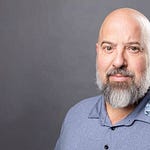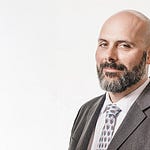"I wanted to do something new. I believed in clean energy. So I jumped."
That’s how Barrett Thomas describes his leap from Army battalion commander to renewable energy developer. After two decades in uniform, including command at Fort Cavazos, Barrett and his family made the call: they were getting out of the military and planting roots in Austin, Texas.
Barrett didn’t want to chase defense contracts or circle the same track. Thanks to a Hiring Our Heroes fellowship, he found his footing at Apex Clean Energy and never looked back.
Today, he develops utility-scale wind, solar, and battery projects in Texas and Oklahoma. But his mission hasn’t changed; it is still “to protect what matters.”
“This work is linked to national security. I believe that. And I want veterans to be part of the future we’re building.”
Rural Roots, Real Impact
Barrett grew up working Texas rice fields. He still has family working in farming today. That gives him a unique perspective in the energy fight happening across Texas and Oklahoma.
He sees firsthand how renewable energy leases help landowners keep farming, keep ranching and keep their kids on the land. It’s not about replacing agriculture. It’s about making it sustainable and generational.
That’s why Barrett has shown up at the Capitol. He’s dropped cards, sat in hearings, and testified on bills that threaten rural landowner rights.
‘This isn’t about hugging trees. It’s about protecting landowner choice and rural prosperity.’
From Rice Fields to High Voltage
At first,Barrett didn’t grow up knowing what a megawatt was. He didn’t have an engineering job lined up. But he had a degree in environmental engineering, a service mindset, and the drive to learn.
Through his fellowship, he learned everything from lease negotiations to transmission design. He studied siting maps. Shadowed teams. He worked on solar, wind, and battery storage projects. Now he’s running major developments across ERCOT and SPP.
‘My job is to take a good idea on a desktop and turn it into spinning turbines and energized solar fields.’
The work is complex. But it’s also community-based. Barrett walks farmland, speaks to ranchers, designs around wildlife, and delivers long-term value to schools, counties, and landowners.
‘These projects bring real dollars. I’m working on one right now that’ll deliver $30 million to a rural county over its lifetime.’
The Veteran Blueprint
Barrett didn’t just land at Apex, he earned his place. He cold-called. Networked on LinkedIn. Took an unpaid internship. Treated it like a four-month job interview. And delivered.
‘I was an infantry officer. I didn’t know anything about clean energy. But I knew how to learn, lead, and show value.’
That’s the blueprint. Veterans don’t need to know every acronym. They need a chance to contribute. And companies like Apex benefit when they invest in those who know how to work hard and figure it out.
‘Veterans might not know the difference between a megawatt and a kilowatt. But they’ll learn it. They’re tough, resilient, and adaptable. They’re worth the investment.’
Barrett now helps other vets get in the door. He offers advice. Opens calls. And champions programs like Project Vanguard to make the path easier for those behind him.
‘This industry is still young. Veterans helped build the last energy system, they should help build the next one.’
And if Barrett’s story speaks to you, share it. This isn’t just about energy. It’s about ownership, opportunity, and building something that lasts.
Because the mission didn’t end when the uniform came off.
Timestamps:
00:00 — Intro & Barrett’s Military Transition
02:14 — Discovering Renewable Energy & Breaking Into the Industry
03:32 — Role at Apex & Project Types
04:08 — Legislative Advocacy & Dropping a Card
05:56 — Landowner Rights, Agriculture, & Energy Coexistence
08:50 — Decommissioning, Recycling, & Industry Accountability
11:15 — Growth of the Industry & Pathways for Veterans
15:36 — Barrett’s Fellowship Experience & Apex Hiring Journey
18:40 — Military Background, Family Life & Career Reflections
22:01 — Current Projects, Community Impact & Policy Landscape
24:03 — How to Prepare for the Next Legislative Session
25:17 — Community Economic Benefits from Projects
28:58 — Impact of Tariffs and Policy Uncertainty
30:55 — Advice to Employers About Hiring Veterans
32:52 — Advice to Veterans Entering the Industry
34:07 — Project Vanguard’s Real Role in Job Access
34:26 — Final Question: What Do You Want to Do When You Grow Up?
Resources:
Clean Energy Industry & Policy References
Texas PUC – Transmission Planning & Energy Oversight
Veteran Career Transition & Fellowship Programs
Department of Defense SkillBridge Program
Find Your Opportunity - Type “Wind Technician” and hit search
Project Vanguard (Veterans in Energy Community)
American Clean Power Association (ACP) — Fellowship Access for Employers
Legislative Advocacy & Policy Engagement
Texas Legislature Online – Drop a Card / Bill Tracker
Representative Stan Lambert (Wind Blade Recycling Bill)












